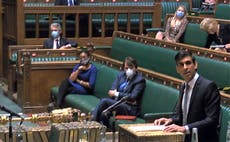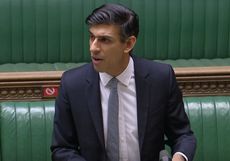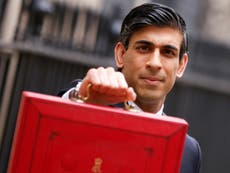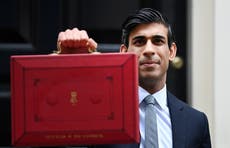Bill for coronavirus support tops £400bn as Rishi Sunak says UK will be paying for decades to come
Taxes to be at ‘highest sustained level in history’, warn experts
Your support helps us to tell the story
From reproductive rights to climate change to Big Tech, The Independent is on the ground when the story is developing. Whether it's investigating the financials of Elon Musk's pro-Trump PAC or producing our latest documentary, 'The A Word', which shines a light on the American women fighting for reproductive rights, we know how important it is to parse out the facts from the messaging.
At such a critical moment in US history, we need reporters on the ground. Your donation allows us to keep sending journalists to speak to both sides of the story.
The Independent is trusted by Americans across the entire political spectrum. And unlike many other quality news outlets, we choose not to lock Americans out of our reporting and analysis with paywalls. We believe quality journalism should be available to everyone, paid for by those who can afford it.
Your support makes all the difference.Britain will be paying the bill for Covid for decades to come after Rishi Sunak’s Budget set the nation on track for the highest tax burden in more than 50 years to pay for total spending of £407bn on pandemic support.
The chancellor announced a further £65bn lifeline for firms and workers, extending furlough, business rate relief and VAT breaks. The £20-a-week universal credit uplift has also been extended for another six months.
But he reversed 10 years of tax-cutting Conservative policy on corporation tax by announcing a hike from 19 to 25 per cent, to be introduced in 2023. And he froze income tax personal allowance thresholds until 2026, dragging 1.3 million low-paid people into paying it as their earnings increase.
The Institute for Fiscal Studies described it as the biggest tax-raising budget since 1993, increasing the state’s net take by £29bn in 2025-26.
The overall tax burden of 35 per cent of GDP will be the highest since Roy Jenkins was chancellor in the 1960s.
And IFS director Paul Johnson said it can be expected to remain high for years, warning: “We are in a new phase of UK economic history. Taxes likely to be at their highest sustained level in history.”
Meanwhile, the Office for Budget Responsibility (OBR) warned that Mr Sunak’s plans make no provision for pandemic spending after 2022.
Indeed, the Treasury’s figures suggest that rapidly falling Covid-19 expenditure will allow a £30bn drop in overall health and social care funding in 2021/22 – something which Labour warned would “increase pressure on staff and do nothing for patients stuck on growing waiting lists”.
Labour leader Sir Keir Starmer accused the chancellor of “papering over the cracks” in a Budget which delivered no new money for social care, health or schools and set other spending departments up for cuts in the coming years.
But Mr Sunak said he was “using the full measure of our fiscal firepower to protect the jobs and livelihoods of the British people” after the worst economic contraction in 300 years.
The success of the UK’s vaccination programme allowed the OBR to bring forward the date at which it expects the economy to return to pre-Covid levels by six months to mid-2022 and slash its forecast of peak unemployment from 11.9 per cent to 6.5 per cent. Its growth forecast for next year was up from 6.6 to 7.3 per cent.
But predicted GDP growth was cut for every other year until 2025. And the official forecaster’s projection of long-term “scarring” remained unchanged, with the economy expected to be 3 per cent smaller in five years than it would have been if the pandemic had not happened.
Mr Sunak told MPs he wanted to be “honest” with British voters about the scale of “corrective action” needed to rebalance the public finances, with borrowing at £355bn – 17 per cent of national income – the highest since the Second World War.
Under his plans, this will tumble to just 0.9 per cent of GDP by 2025-26. But the underlying national debt will continue to rise from a historic high of £2.2 trillion now to more than £2.8 trillion at the end of the forecast period, peaking as a share of GDP at 97.1 per cent in 2023-24.
“The amount we’ve borrowed is comparable only with the amount we borrowed during the two world wars,” said the chancellor.
“It is going to be the work of many governments, over many decades, to pay it back.
“Just as it would be irresponsible to withdraw support too soon, it would also be irresponsible to allow our future borrowing and debt to rise unchecked.”
In one of the most comprehensively trailed Budgets in history, Mr Sunak had few surprises in his red box.
He announced a “super-deduction” mechanism, which will cut companies’ tax bill by 25p for every pound they invest in new equipment over the next two years, designed to unlock a £118bn corporate cash pile built up during the pandemic to be spent in the immediate period after coronavirus restrictions are lifted.
He named the first eight areas – East Midlands airport, Felixstowe and Harwich, Humber, Liverpool City Region, Plymouth, Solent, Thames and Teesside – to take on freeport status, which he said would generate jobs and unlock billions in private sector investment, but which critics argue will relocate rather than create economic activity.
And he sparked controversy with a £4.8bn “levelling up fund”, which includes his own constituency, as well as those of cabinet colleagues Robert Jenrick, Brandon Lewis, Simon Hart and Alister Jack, as priority areas to bid for cash, ahead of deprived authorities like Barnsley, Flintshire, Coventry, Plymouth, Salford and the Wirral.
Other measures included:
- Stamp duty holiday for properties less than £500,000 extended until the end of June, followed by a lower £250,000 threshold until the end of September.
- State-backed guarantee for mortgages of up to £600,000 with a 5% deposit.
- Furlough worth up to 80 per cent of wages extended to September, with employers expected to contribute from July.
- Temporary 5 per cent VAT rate for tourism and hospitality sector extended to the end of September, with an interim rate of 12.5 per cent for six months after that.
- Business rates holiday for the retail, hospitality and leisure sectors extended until the end of June, with a discount applying for the rest of the financial year.
- “Restart grants” totalling £5bn worth £6,000 to non-essential retail businesses as they reopen and £18,000 to pubs, restaurants and gyms.
- Freeze on alcohol and fuel duties.
Mr Sunak avoided breaking the “triple tax lock” promise in the Conservatives’ 2019 manifesto, which pledged not to increase rates of income tax, national insurance or VAT.
But his personal allowance freeze will rake in an additional £8.2bn a year by 2025-26 by forcing workers into higher bands as their earnings rise.
The point at which income tax becomes payable will increase by £70 to £12,570 in April, but stay at that level until April 2026. Meanwhile, the 40p rate threshold will increase by £270 to £50,270 before being frozen.
The change will mean 10 per cent of adults paying the higher rate, compared to around 8 per cent now. It will result in the richest fifth of households paying £826 per year more on average, compared to £56 for the bottom 20 per cent, according to calculations by the Resolution Foundation think tank.
The Institute for Fiscal Studies said about 1.3 million people would be brought into the income tax system, with about 10 per cent of adults brought into the higher 40p rate.
The corporation tax increase to 25 per cent will raise £17.2bn in 2025-26, although only firms with profits of £250,000 or more will pay the full rate.
Mr Sunak insisted the UK would still have the lowest effective corporation tax rate in the G7 group of industrialised economies.
But Tony Danker, director-general of the Confederation of British Industry, said the move would “cause a sharp intake of breath for many businesses and sends a worrying signal to those planning to invest in the UK”.





Join our commenting forum
Join thought-provoking conversations, follow other Independent readers and see their replies
Comments